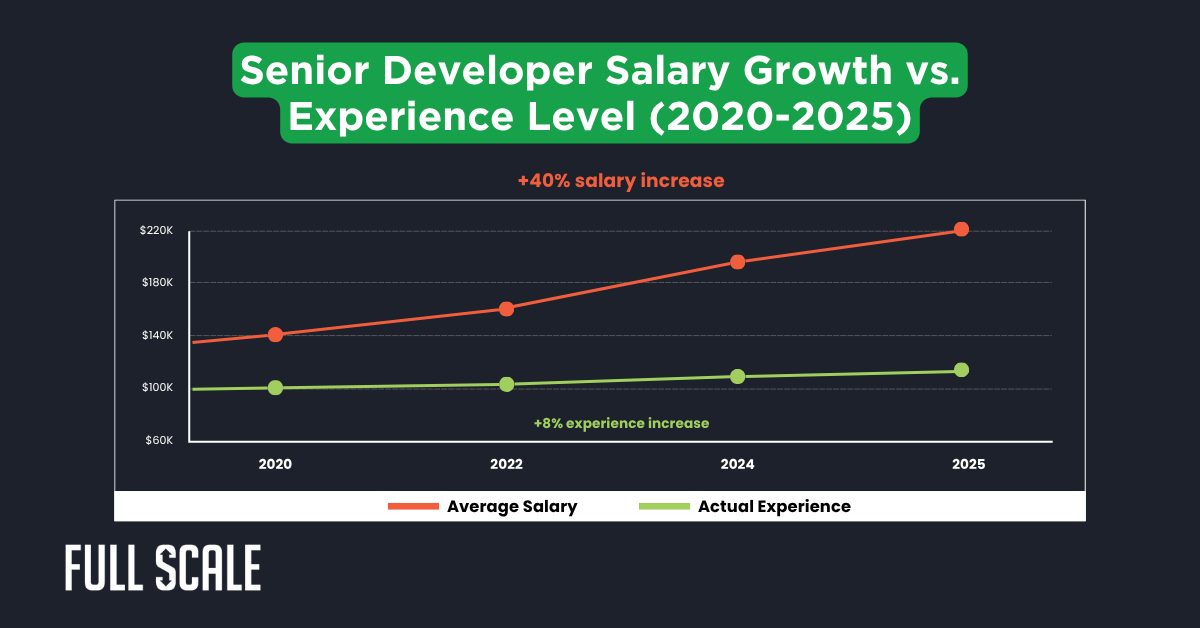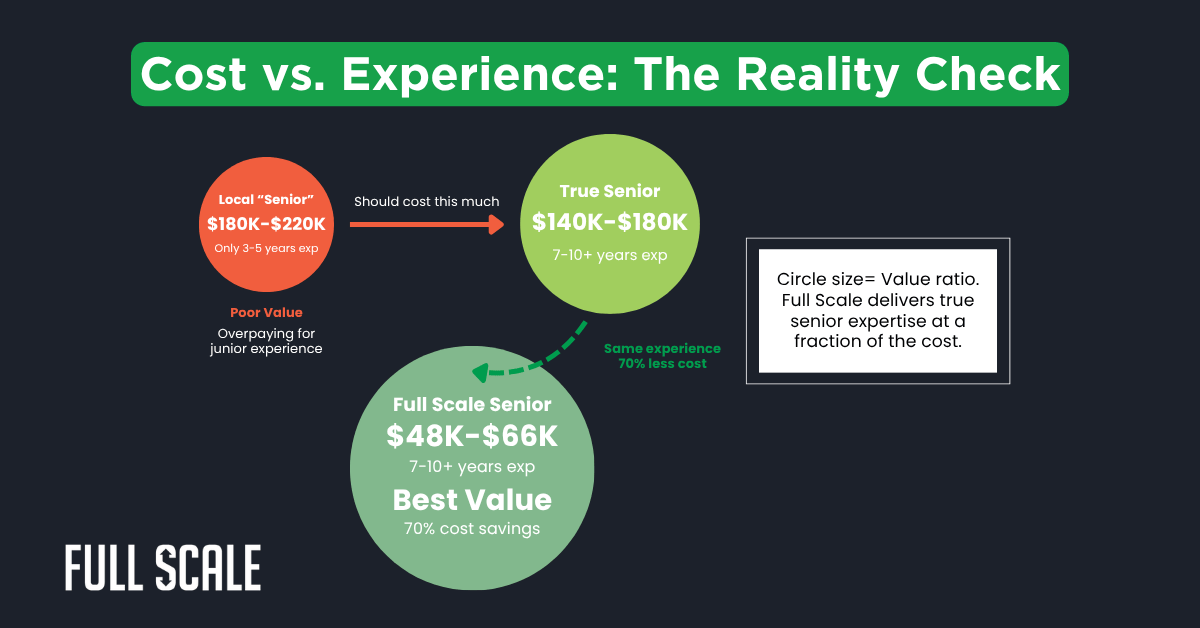Senior Developer Salary Inflated 40% and Costing You $180K in Technical Debt
That $180K “senior” developer you just hired? They’re a mid-level engineer with an inflated title.
And you just took on technical debt.
Here’s the brutal truth: senior developer salary inflated by 40% since 2020. But the actual skill level didn’t increase. You’re paying premium prices for mid-level output. Every overpaid hire creates more technical debt than they solve.
Are senior developer salaries inflated?
Yes. Senior developer salaries increased 40% since 2020 to $180K-$220K, but title inflation means you're paying for 7-10 year experience while getting 3-5 year developers. The result: You overpay 60% while getting 30% less architectural thinking, mentoring ability, and problem-solving depth. This creates technical debt as these "seniors" lack experience to prevent costly mistakes.
According to Coursera’s 2024 Software Developer Salary Guide, the median salary for developers labeled “senior” hit $130,000 nationally. But here’s what they don’t tell you: Many with “senior” titles have less than 5 years of total coding experience.
That salary isn’t an investment. It’s debt you’re paying interest on.
What You'll Learn in This Article:
- Why senior developer salary inflated 40% while actual experience barely changed
- The real cost of that $180K hire (it's actually $312K+ in year one)
- How to identify title-inflated "seniors" versus true senior developers
- Why you're trapped in this expensive system and can't compete
- The staff augmentation alternative that cuts costs 60% with better quality
- Actionable steps smart CTOs use to escape the salary arms race
Senior Developer Salary Inflated by Title Crisis: Why This Happened
The market went insane between 2020 and 2025. Senior developer salary 2025 averages hit $180K-$220K in major tech hubs. That’s up from $120K-$140K just five years ago.
But skills didn’t increase by 40%. Titles did. This is how senior developer salary inflated without actual value increases.
Three Forces Created This Mess
Supply and demand broke the system. Tech companies compete for the same talent pool. Remote work expanded competition globally. Every company now “needs” senior developers yesterday.
Title inflation became epidemic. Companies promote 3-year developers to “senior” to retain them. Recruiters inflate titles to justify their 20-30% fees. Market pressure forces you to match competitors’ inflated titles.
The FAANG effect killed your budget. Google, Meta, and Amazon set unsustainable benchmarks. Mid-size companies compete on salary alone. It’s a bidding war nobody wins except the developer who leaves in 18 months.
You’re not competing with other mid-size companies anymore. You’re competing with Google’s unlimited budget. Spoiler: You’re going to lose.

This chart shows the disconnect clearly. Salaries skyrocketed while actual experience barely moved. That gap is where your technical debt lives.
Understanding why senior developers are so expensive starts with recognizing this isn’t about value. It’s about market delusion at scale. When senior developer salary inflated this dramatically, something fundamental broke in the hiring ecosystem.
Senior Developer Title Inflation: What "Senior" Actually Means Now
Five years ago, “senior” meant something specific. Today, it’s marketing to justify higher salaries. The definition changed, but expectations didn’t.
What senior used to require: 7-10+ years of hands-on experience across multiple systems. Proven architecture design that scaled successfully. Technical leadership of 2-3 junior developers with measurable improvement. Cross-functional communication with business stakeholders fluently. Understanding that connects code decisions to revenue impact.
What “senior” means now: 3-5 years of coding experience in similar roles. Can complete assigned tasks independently without daily supervision. May have never designed a system from scratch. Limited or zero mentoring experience demonstrated. Focused on technical execution without strategic thinking.
Five years of copy-pasting Stack Overflow doesn’t make you senior. But the market pretends it does. This is the core of senior developer title inflation across the industry.
| True Senior (7-10+ years) | Title-Inflated "Senior" (3-5 years) |
|---|---|
| Designs systems and architecture from scratch | Codes features within existing systems |
| Anticipates technical debt before it happens | Creates technical debt unknowingly |
| Actively mentors 2-3 junior developers | Needs guidance on complex problems |
| Translates technical decisions to executives | Struggles explaining decisions to non-technical stakeholders |
| Understands business impact of every technical choice | Focuses on technical perfection over business value |
| Makes entire team 2-3x more productive | Works independently but doesn't multiply force |
This comparison shows the reality between true and inflated seniority. One column justifies $180K salaries honestly. The other doesn’t, yet both get labeled “senior” in today’s inflated market.
How Much Should a Senior Developer Cost?
A true senior developer should cost $140K-$180K locally for proven experience. That’s for 7-10+ years of experience with real architecture capabilities. Title-inflated “seniors” with 3-5 years now demand $180K-$220K due to market pressure alone.
You’re paying a 40% premium for an inflated title. Not actual senior-level capabilities that justify the investment. This is how much a senior developer costs versus what the broken market charges.
I’ve seen this pattern dozens of times at Full Scale with incoming clients. Companies hire a “senior” developer at $190K expecting immediate impact. Six months later, they’re asking why architectural decisions keep creating problems. Why junior developers aren’t improving faster. Why does this “senior” need constant guidance on complex challenges?
Because they’re not actually senior level. The senior developer salary inflated through title manipulation, not genuine skill development over the years.
The Terrifying Math: Why $180K Is Actually $312K
Let’s calculate the real cost to hire a senior developer with inflated titles. The number is significantly worse than you think. Most CTOs only look at the salary line item.
Smart CTOs look at the total cost of ownership over time. Here’s what that $180K hire actually costs your company in real dollars.
True Cost Calculator: What Your "Senior" Developer Really Costs
• Slowed junior developer productivity: $30K
• Communication gaps delaying projects: $100K+
This calculator reveals the truth about inflated salaries in real numbers. Play with the salary input field. Watch how quickly your investment becomes measurable technical debt.
What You’re Actually Getting
That $312K first-year investment buys you a mid-level developer with a senior title. Someone who executes tasks but can’t architect scalable solutions. Technical debt accumulation instead of reduction through poor architectural choices. A team member, not a force multiplier, who improves everyone.
Are senior developers worth it at $180K when they’re actually mid-level? Not when they’re mid-level developers with inflated titles only. You’re paying for experience and capabilities they simply don’t have yet.
You thought that salary would buy someone who makes your whole team better. Instead, you got someone who needs your team to succeed daily. Now multiply that hiring mistake across your entire engineering organization systematically.
Congrats, you’ve got a $2M problem caused by senior developer salary inflated beyond the actual value delivered. Every similar hire compounds the problem exponentially. The technical debt accumulates faster than you can pay it down.
Why Senior Developer Salary Inflated Prices Keep You Trapped
You know the system is fundamentally broken. So why do you keep paying inflated rates anyway? Four traps keep you stuck in this expensive cycle.
Most CTOs fall for at least three of these traps. Understanding them is the first step toward escaping.
The Salary Arms Race
Your local competitor offers $185K to your candidate. You counter with $190K to stay competitive. They go to $200K to close the deal. Nobody wins except the developer who leaves in 18 months for $220K.
You can’t outbid Google’s unlimited budget. But you keep trying anyway, despite knowing it’s futile. This is how senior developer salary inflated without anyone actually winning long term.
The Recruiter Incentive Problem
Recruiters make 20-30% of whatever salary they successfully negotiate. A $180K placement pays them $45K-$54K in commission. A $120K placement pays just $30K-$36K commission. Zero incentive exists for them to find genuinely cost-effective talent.
They actively inflate titles and salary expectations systematically. It’s literally how they earn significantly more money personally. Your loss is directly their commission gain.
Industry-Wide Delusion as Justification
“Everyone else is paying this much” becomes your primary reasoning. Fear of looking cheap or losing talent drives emotional decisions. Worry about competitor poaching clouds rational judgment completely. Industry-wide delusion doesn’t make it a smart long-term strategy.
Just because everyone’s jumping off the cliff doesn’t mean there’s water below. Your competitors are drowning in expensive mediocrity right now. Don’t join them in the expensive delusion.
Sunk Cost Fallacy in Action
You already invested $50K in expensive recruiting efforts. You already spent six months on this hiring process. “We’ve come this far; we have to close this candidate now.” So you overpay for mediocre talent and call it a successful win.
This is exactly why senior developers are so expensive, even when they shouldn’t be. You keep validating inflated prices through continued participation. The market responds to what buyers actually accept, not what makes economic sense.
The system stays broken because everyone participates in the delusion together systematically. Breaking free requires acknowledging the uncomfortable truth about senior developer salary inflated beyond its actual value.
The Offshore Alternative: How Smart CTOs Cut Costs 60%
Yeah, I’ve heard the horror stories too, about offshore development. Unreliable developers, communication nightmares, and money wasted on failed projects. I get it completely. But here’s what changed in the last five years at Full Scale.
Why Old Offshore Models Failed
Project-based outsourcing through middlemen created the industry horror stories. Developers treated as disposable contractors had zero loyalty. No integration with actual teams meant communication broke down constantly. High turnover of 40-60% annually guarantees complete inconsistency.
“You get what you pay for” was actually true then. For those genuinely broken models that dominated the industry. But Full Scale fixed offshore development by fixing the fundamentally broken model.
What Full Scale’s Staff Augmentation Does Differently
Direct integration means they work on your Slack and attend your standups. Full-time dedicated developers, not contractors juggling three competing projects. They’re your team members on Full Scale’s payroll with full benefits. 95%+ retention rates prove the model works sustainably.
They think like employees, not temporary vendors. Because that’s exactly how we treat them at Full Scale, this is the real alternative to a senior developer salary inflated beyond justification.
In our Full Scale’s transparent pricing, senior developers cost $4,000-$5,500 monthly total. That’s $48K-$66K annually for actual 7-10+ year senior experience verified. Not title-inflated mid-level developers pretending to be senior.
| Cost Factor | Local "Senior" (Title-Inflated) | Full Scale Senior (Staff Aug) |
|---|---|---|
| Annual Salary | $180,000-$220,000 | $48,000-$66,000 |
| Benefits Burden | $54,000-$66,000 | Included in rate |
| Recruiter Fees | $45,000-$55,000 | $0 (no recruiters) |
| Time to Hire | 90-120 days | 14-21 days |
| Average Tenure | 18-24 months | 95% retention rate |
| Actual Experience | 3-5 years (mid-level) | 7-10+ years (true senior) |
| Two-Year Total Cost | $500,000-$600,000 | $96,000-$132,000 |
This comparison shows the reality clearly and objectively. 70-80% cost reduction plus genuinely better quality equals smart business. Not cheap shortcuts that compromise quality or long-term success.
The Quality Question Everyone Asks
“But are they actually good developers?” Short answer: Full Scale’s best developers are better than your title-inflated local “seniors.” I’ve seen it proven dozens of times.
Why does this work so well? Vetted for actual senior-level skills, not just years on LinkedIn profiles. Proven architecture experience is required before we even consider them seriously. Cultural focus on long-term employment, not job-hopping every 18 months for raises. A global talent pool means access to exceptional developers your competitors can’t find locally.
The right offshore model doesn’t give you “cheaper” developers only. It gives you actual senior developers at what senior developers should legitimately cost. That’s the difference between offshore senior developer cost reality and local market delusion today.

This visual makes it obvious what you’re actually buying. One option gives you real senior skills at fair prices. The others don’t deliver proportional value. This is how much a senior developer costs when title inflation doesn’t distort reality.
When senior developer salary inflated this far beyond delivered value, alternatives like Full Scale become essential. Not just smart choices, but necessary for competitive survival long-term.
What Smart CTOs Do to Reduce Software Development Costs
You have two clear choices now. Keep paying inflated prices for inflated titles indefinitely. Or hire actual senior developers at actual senior prices through Full Scale today.
Smart CTOs have already made their choice decisively. Here’s the exact playbook they follow systematically.
Stop Doing These Things
- Competing on salary alone against companies with unlimited budgets
- Trusting recruiter-inflated titles without independent verification of skills
- Hiring locally because “that’s what everyone does” without question
- Paying $180K for developers with only 3 years of actual experience
Start Doing These Instead
Redefine “senior” for your actual needs clearly. Document what senior means beyond years of experience, specifically. Test for architecture thinking during interviews, not just coding ability. Require demonstrated mentorship experience with specific concrete examples. Focus on business impact understanding demonstrated through past actual work.
Access global talent pools strategically through Full Scale’s proven model. Consider Full Scale’s staff augmentation for direct team integration immediately. Verify 95%+ retention rates as proof of a sustainable quality model. Ensure no-middleman access to your developers daily in real-time. Demand month-to-month contracts, not annual commitments that lock you in.
Calculate the total cost, not just the salary in isolation. Include the real two-year cost with turnover factored accurately into calculations. Factor in technical debt creation versus reduction through architectural decisions. Measure team productivity impact, not individual output alone in isolation. Track time-to-productivity for new hires objectively with clear metrics.
Test before committing long-term with Full Scale developers first. Start with 1-2 developers as proof of concept immediately. Measure actual results against your inflated local “seniors” objectively. Scale what works at Full Scale, kill what doesn’t quickly. Verify skills through real work, not superficial interviews alone.
The bottom line: senior developer salary inflated by market delusion, not actual value. Smart CTOs stopped playing that losing game when they discovered Full Scale. They’re now building better teams for 70% less cost long-term.
Why Partner With Full Scale
We fixed offshore development by fixing the broken model completely. Here’s what makes Full Scale different from both local hiring and traditional outsourcing:
- 95% developer retention rate vs. industry average of 60-70%
- Direct integration model – your team, our payroll, zero middlemen
- Vetted senior developers with proven 7-10+ years of track record
- 14-21 day hiring process vs. 90-120 days local recruiting
- Month-to-month contracts – no long-term lock-ins or commitments
- 300+ pre-vetted specialists across all major tech stacks
- U.S.-based contracts for IP protection and legal clarity
- 60+ successful client companies in FinTech, HealthTech, and SaaS
We don’t just save you money on offshore senior developer costs alone. We give you actual senior developers who create measurable value instead of technical debt. That’s how you escape the trap of senior developer salary inflated beyond justification completely.
When you partner with Full Scale, you’re not just reducing software development costs superficially. You’re accessing true senior talent at prices that reflect actual experience clearly. Not market delusion driven by title inflation and salary arms races.
Learn more about how Full Scale works and why our staff augmentation approach delivers results that traditional offshore models can’t match.
See How Much You're Really Overpaying
The Real Cost of Inflated Salaries
Every month you wait costs you thousands in unnecessary expenses. Every day, the technical debt compounds. Smart CTOs have already stopped the bleeding.
Yes. Senior developer salary inflated 40% since 2020 to $180K-$220K, but title inflation means you’re paying for 7-10 years of experience while getting 3-5 years of developers. Companies promote early to retain talent, recruiters inflate titles for higher fees, and FAANG benchmarks force unsustainable competition.
True seniors with 7-10+ years should cost $140K-$180K locally. Through Full Scale’s staff augmentation, actual senior developers cost $48K-$66K annually according to transparent pricing. Current $180K-$220K rates reflect title inflation, not skill inflation—you’re paying 40% more for developers lacking true senior capabilities.
Salary inflation is market-driven price increases for the same skill level. Title inflation is promoting mid-level developers (3-5 years) to “senior” titles without corresponding skill development, then paying senior salaries for mid-level work. Both happen simultaneously: salaries up 40%, experience up only 8%—that 32-point gap is pure title inflation.
When using Full Scale’s staff augmentation with direct integration, offshore seniors often exceed local “senior” quality. They’re vetted for actual senior skills, have proven 7-10+ years of architecture experience, and show 95% retention versus 18-month local averages. The key is avoiding traditional outsourcing—Full Scale provides dedicated developers who integrate directly into your team.
Market dynamics create the problem: companies compete for limited talent and promote early to retain, recruiters inflate titles for 20-30% commissions, and FAANG benchmarks force mid-size companies to match unsustainable rates. Nobody corrects the market, so everyone validates inflated prices. Result: $180K for 3-5 year developers while actual seniors remain undervalued globally.



